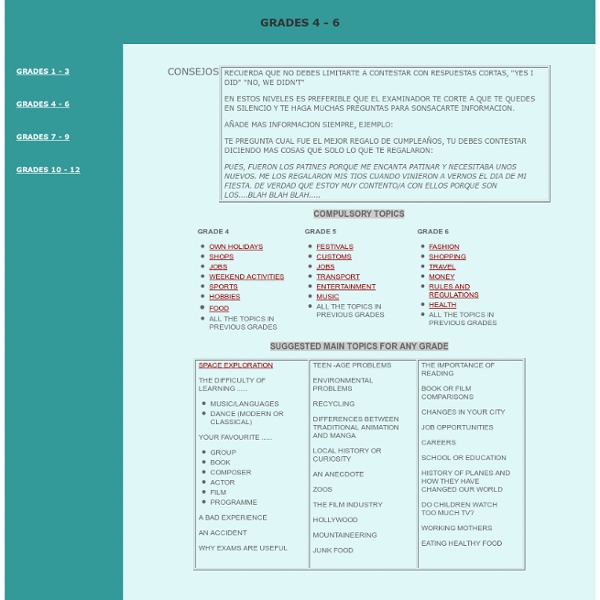



Discussion topics for English language learners Prepare for Discussion 28 topics-- for the Higher Intermediate & Advanced levels----START 01 Alternative Beliefs 02 Animal Welfare 03 The Arts 04 Crime & Punishment 05 Cultural Differences 06 Economics 07 Education 08 Environment 09 Fashion 10 Food 11 Health 12 Holidays 13 Language Learning 14 Male & Female Roles 15 Marriage 16 The Media 17 Political Systems 18 Religion 19 Rich & Poor World 20 Science & Technology 21 Society 22 Sport 23 Tradition 24 Transport 25 Travel 26 Violence 27 Work 28 Youth & Old Age -----© Ted Power Glossary of Ten Discussion Techniques - detailed index List of the 28 Topics for Discussion [ This list of the 28 topics can be printed out for learners' or teachers' reference ] -- Higher Intermediate vocabulary and discussion - topics 1 to 10: 1. -- Higher Intermediate vocabulary and discussion - topics 11 to 20: 11. -- Higher Intermediate vocabulary and discussion - topics 21 to 28: 21. Return to the TOP of this page
Conversation Questions for the ESL/EFL Classroom If this is your first time here, then read the Teacher's Guide to Using These PagesIf you can think of a good question for any list, please send it to us. Home | Articles | Lessons | Techniques | Questions | Games | Jokes | Things for Teachers | Links | Activities for ESL Students Would you like to help? If you can think of a good question for any list, please send it to us. If you would like to suggest another topic, please send it and a set of questions to begin the topic. Copyright © 1997-2010 by The Internet TESL Journal Pages from this site should not be put online elsewhere.Permission is not required to link directly to any page on our site as long as you do not trap the page inside a frame.
Plagiarism Checker Benefits of SmallSEOTools’ Plagiarism Detector The plagiarism checker free utility offered on SmallSEOTools’ is second to none due to the advantages it provides to its users. From students to teachers, researchers, writers, publishers, and bloggers, everyone can gain the top benefits of SmallSEOTools’ plagiarism detector, which include the following: Quick and Hassle-Free The plagiarism checker online tool available on this platform is a super-fast utility that generates results within a matter of seconds. Multi-Platform Supportive Our plagiarism detector is a web-based tool that can be accessed through any kind of device. Free Plagiarism Checker There are no costs involved with the usage of SmallSEOTools’ plagiarism checker. Find Matching Sources When it comes to detecting plagiarism, everybody desires to know about the links from where their text matches. A list of key features: 1. 2. It has an option for automatically rewriting the content you run on it in just one click. 3. 4. 5. 6. 7.
useful phrasal verbs Important Infrequently Used Words To Know Paul V. Hartman (The Capitalized syllable gets the emphasis) alacrity a-LACK-ra-tee cheerful willingness and promptnessanathema a-NATH-a-ma a thing or person cursed, banned, or reviledanodyne AN-a-dine not likely to cause offence or disagreement and somewhat dull//anything that sooths or comfortsaphorism AFF-oar-ism a short, witty saying or concise principleapostate ah-POSS-tate (also: apostasy) person who has left the fold or deserted the faith.arrogate ARROW-gate to make an unreasonable claimatavistic at-a-VIS-tic reverting to a primitive typeavuncular a-VUNC-you-lar “like an uncle”; benevolent bathos BATH-ose an anticlimaxbereft ba-REFT to be deprived of something valuable “He was bereft of reason.” cynosure SIGH-na-shore (from the Greek: “dog’s tail”) center of attention; point to which all eyes are drawn. dilettante DILL-ah-tent 1. having superficial/amateurish interest in a branch of knowledge; 2. a connoisseur or lover of the fine arts Click to read: Like this: Related
proverbs TRADITIONAL PROVERBS: A barking dog never bites. A bird in the hand is worth two in the bush A fool and his money are soon parted. A friend in need is a friend indeed. A new broom sweeps clean. A nod's as good as a wink to a blind man. (e.g., it doesn't make any difference what you do -- they don't know!) Back to Rainbow Humor Page
Writing Exercises and Prompts List of essay topics List of essay topics includes essays that helps you in learning English, especially writing and speaking: Note: There are approximately 1,000 essays in the list of essays; however there are many more essays especially recent published essays not in the list. You are recommended to use the google search box on the top of our site to fully search for the essay you want in the whole site of our own. With the google search box, you can find out the essay you are looking for easily and quickly. * Put the essay topic in the google search box to search for the essay. School:* Do you think that homework should be abolished? * The importance of examinations (uncategorized)* Examination day often makes many pupils worry. * School life is the most difficult time but it also keeps many joys for us. * What do you think of the use and abuse of private tuition? * What makes an ideal teacher: Give your opinion.* Talk about your teacher of English* My teacher (uncategorized) * "News travels fast".